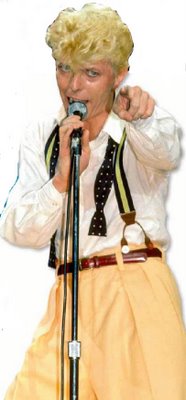
The strongest impression left by your press conference was your concern about the worthwhile nature of popular music.
“For me, personally. My business is my business and it just strikes me… er, I don’t really have the urge to continue as a songwriter and a performer in terms of experimentation – at this moment. I feel that at the moment I’m of an age – and age has an awful lot to do with it – I’m just starting to enjoy growing up. I’m enjoying being my age, 36, and what comes with it in terms of the body. It actually physically changes. Mentally and emotionally there are
big changes, especially if you have been thrust in front of popular and mass observation.
“If you’ve been observed, as I have for the last 12 years, well, you have to contend with that one way or another. You either care about it, or you don’t any more. You think, ‘Well, as I have this
platform, there’s something I can do with it.’
“And, frankly, I don’t think I would want to continue performing any more if I didn’t think I could do something hopeful and helpful with my music, both for myself and my audience.”
How do you define music that is “hopeful and helpful”? What evidence we have from you at the moment is a celebratory dance record, as opposed to something that points anywhere.
“Yes. I think it will have a lot to do with (adopting a mock preachy tone) people shouldn’t fight each other. People shouldn’t kill each other and people should try to live together.”
Isn’t that a little simplistic?
“Yes, it is simple.”
Your positivism seems to parallel that of Jack Celliers, the character you play in Nagisa Oshima’s Merry Christmas Mr Lawrence – leading by action and deed.
“Instead of intimating change try and do something about it.”
You identified pretty closely with the character, then?
“Yeah, I think I immediately identifi ed with him because of his own personal turmoils, his and mine stemming from different sources. With Celliers, he’s ridden with guilt most of his life
because of his relationship with his younger brother, which caused him to embrace that particular strength. That is pointed up a lot more in Oshima’s screenplay than it probably is in the book.
“I guess it’s the idea of through all my experimentations I have learned a lot and there must be something I can do with it on a very simplistic level now. I don’t have the urge to play around with musical ideas. At the moment. Any more.”
The present loss of urge to experiment… is that an indictment of the ‘Low’/‘Heroes’/‘Lodger’ period? Can’t humanity and technology sit together?
“It’s just another way of using my songs, I think I’m just a little tired of experimentation now. But electronics are rewarding in terms of playing around with atmosphere and trying to reach
different parts of the mind, funny corners of the mind…”
But there is a proliferation of synthetic instruments being used in that kind of icy cold vein.
“It’s such a wide sweeping statement that, at the moment, I feel it’s very hard to use those instruments without a kind of preconditioning already there. That if you use the synthesizer it
means this particular thing: that I’m part of this angular society.
Go to Page 1_Go to Page 3





0 COMMENTS:
Post a Comment